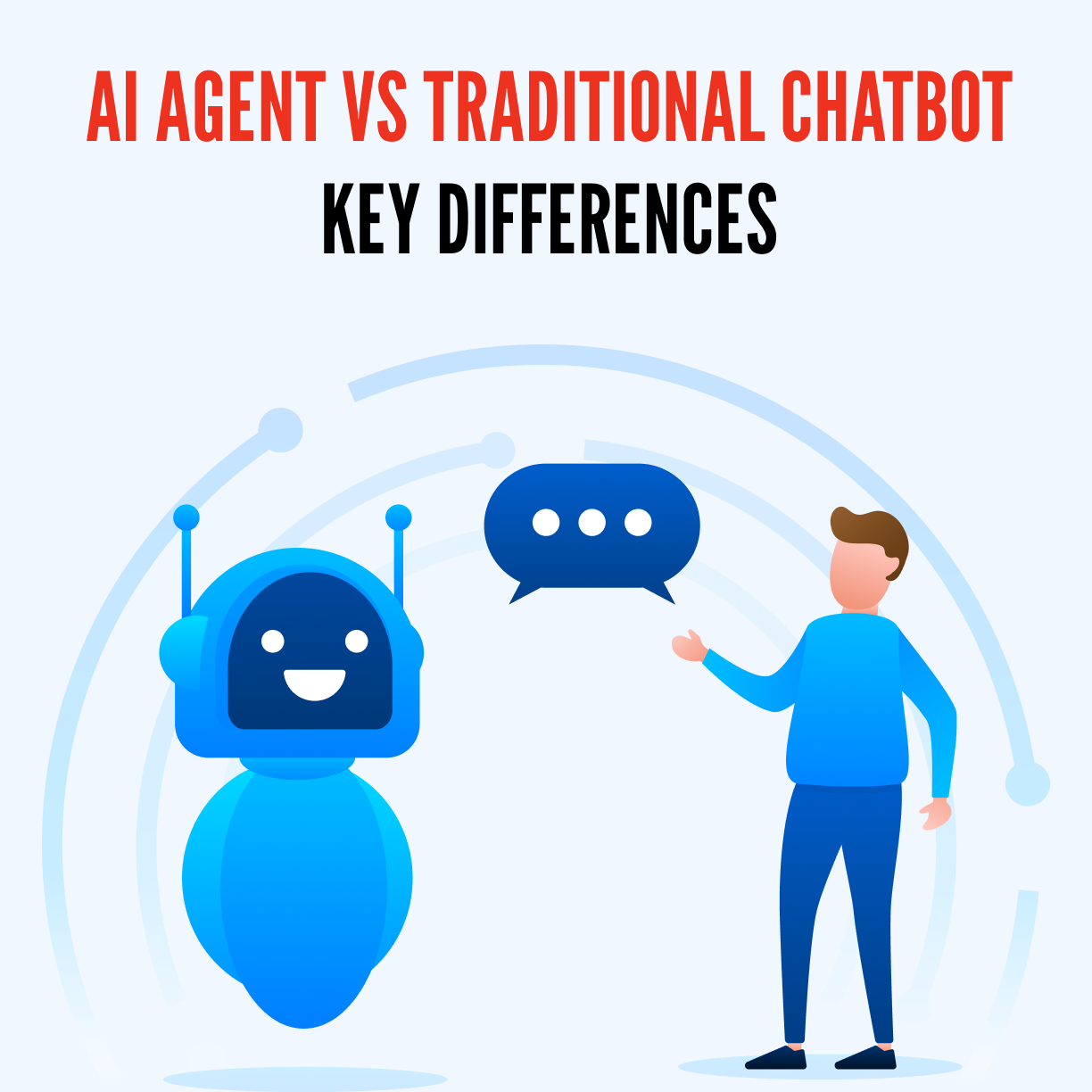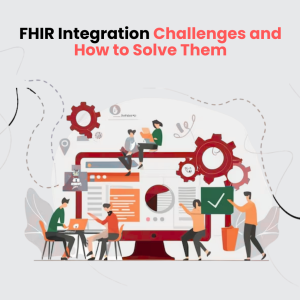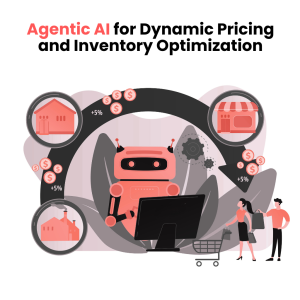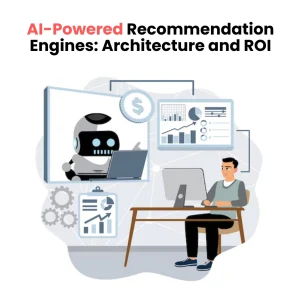The digital customer experience has transformed rapidly over the last decade. Where simple, rule-based chatbots once handled predictable user queries, today’s interactions demand intelligence, empathy, and flexibility. Today, companies operate in a space where customers’ expectations are shaped by real-time, highly personalised digital experiences. An AI agent plays a crucial role in this scenario.
Chatbots first emerged as cost-saving tools—scripts to answer FAQs, book appointments, and route users to support teams. Although useful, they would often leave customers even more frustrated by being rigid and unable to put events in context. AI agents, on the other hand, are a step ahead in sophistication. These systems do not simply respond; they understand, learn, and adapt.
Knowing the difference between these two technologies is more than a technical curiosity; it is a strategic need. Choosing correctly chatbot vs AI agent for business can mean improved customer satisfaction and less overhead while providing a scalable solution that will grow with your business.
Are you unsure which technology is best for your business? [Talk to our AI experts today].
What is a Traditional Chatbot?
Older platforms are just computer software developed to simulate conversation with pre-established rules and scripts. In general, bots work with a so-called “if-this-then-that” logic scheme. They may recognise certain keywords or commands and respond accordingly, but their performance remains absolutely limited within the range they have been programmed to handle.
Common Characteristics:
- Rule-based interaction with fixed sets of conversational pathways.
- The system cannot grasp context or user history.
- It absolutely cannot accommodate nuances, slang, or unexpected questions.
- A graceful failure or a loopback should accompany any unacceptable question.
Common Use Cases:
- Responses to FAQs (hours of store operation, refund policies)
- Navigation through static menus (press along for support, 2 for billing)
- Booking a service or confirming an appointment
While traditional chatbot vs AI agent for business are effective for simple, repetitive tasks, they lack the ability to generate complex conversations or provide personalised, meaningful interactions.
Starting small? A traditional chatbot might still be a fit. [Learn how we can help.]
What is an AI Agent?
AI agents stretch far beyond the limits of rule-based systems. These intelligent agents are built on advanced technologies, such as Natural Language Processing (NLP), machine learning, and large language models (LLMs). They are capable of understanding human languages, keeping context, and making decisions independently.
Key Capabilities are:
- Contextual understanding: Can track the multi-turn conversation and refer back to earlier points.
- Self-learning: Over time, responses improve as the system learns from user interaction.
- Personalisation: Build conversations on user data, preferences, and behaviours.
- Handling complex tasks: From multi-leg travel bookings to problem-solving with tech issues.
AI Agent Examples:
- Chatbot vs AI assistant, which manages calendars, responds to emails, and books meetings.
- AI-powered customer support reps resolve billing issues or other tech support queries.
- These function as intelligent agents in HR on their own by onboarding new hires and answering policy questions.
Indeed, these are just a few examples of the assorted functionalities of AI. AI agents do not only automate but also humanise and optimise these business interactions.
Ready to explore AI agents for your business? [Request a custom consultation].
Key Differences Between AI Agents vs. Traditional Chatbots
Understanding the technological and functional distinctions between these systems can help businesses choose the right tool for their needs.
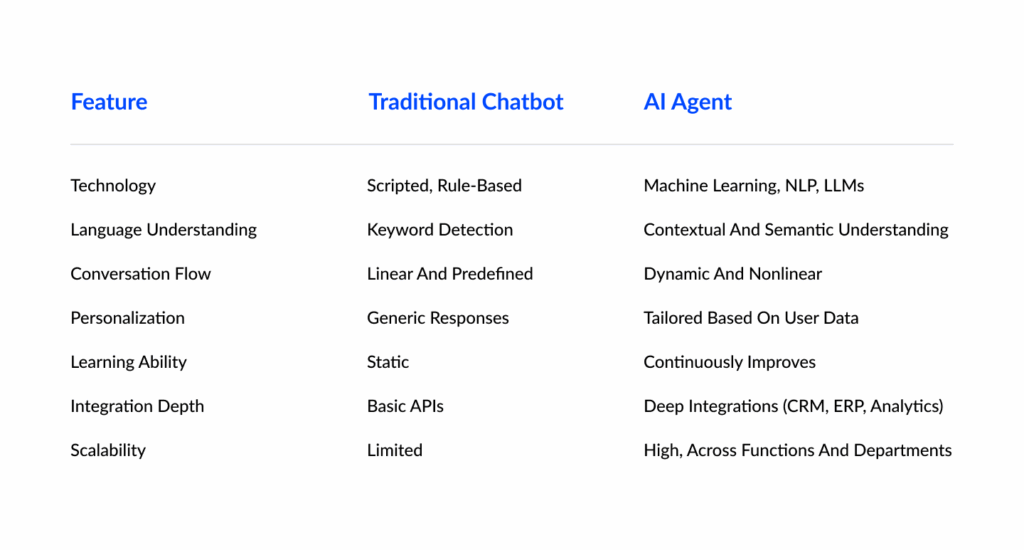
| Feature | Traditional Chatbot | AI Agent |
| Technology | Scripted, rule-based | Machine learning, NLP, LLMs |
| Language Understanding | Keyword detection | Contextual and semantic understanding |
| Conversation Flow | Linear and predefined | Dynamic and nonlinear |
| Personalization | Generic responses | Tailored based on user data |
| Learning Ability | Static | Continuously improves |
| Integration Depth | Basic APIs | Deep integrations (CRM, ERP, analytics) |
| Scalability | Limited | High, across functions and departments |
These differences aren’t just technical—they translate directly into the quality of customer experience and operational efficiency.
Need help mapping these capabilities to your business goals? [Let’s talk about strategy.]
Advantages of AI Agents vs Traditional Chatbots
Implementing an AI agent is not simply a matter of having better technology on board; it must provide real value to the business on multiple levels.
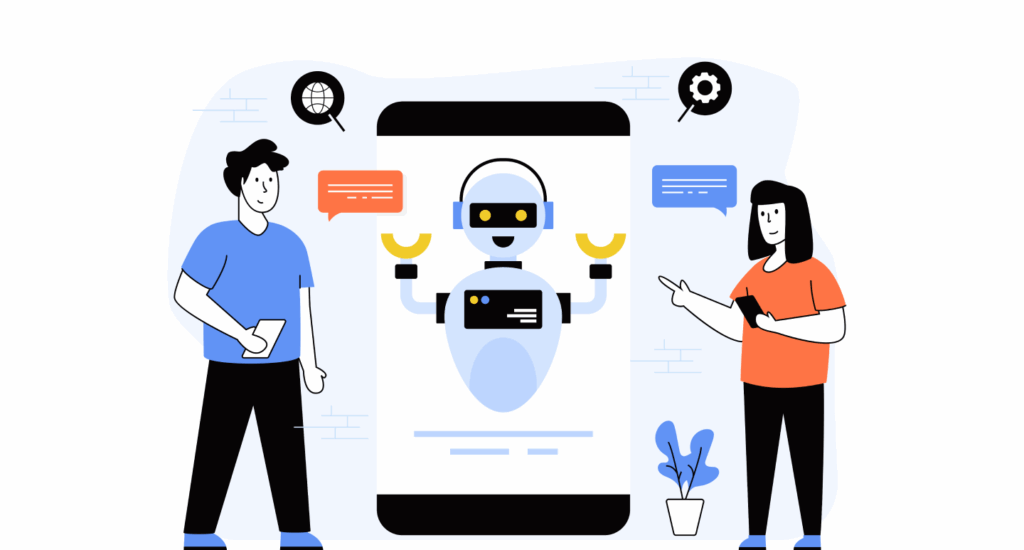
1. Better Customer Experience
AI agents provide an experiential service through conversation that resembles that of humanity. Detecting intent, empathetic responses, and remembering previous conversations lead to increased customer satisfaction and loyalty.
2. Scalability and Flexibility
AI agents learn from every contact with users, unlike traditional bots that require manual programming for each new request type. This makes them relevant for companies experiencing rapid growth or high support volumes.
3. Increased Automation
AI agents often resolve problems as complex as returning products, creating quotes, or updating customer records without the involvement of a human agent, allowing teams to attend to strategic priorities.
4. Cost Savings in the Long Run
While investments needed for setting up AI agents may be higher than those incurred with foundation systems, they yield a giant ROI in terms of increasing overall capability for handling customer interactions while reducing dependence on large support teams and data-centric decisions in real-time.
Thinking long-term? AI agents deliver both efficiency and growth. [Get started today.]
Limitations of Traditional AI Agent vs Chatbot
While chatbots can serve as entry-level automation tools, their limitations become clear in more demanding environments.
Challenges with Traditional Chatbots:
- Rigidity: Unable to pivot when users deviate from expected inputs.
- Lack of memory: Cannot recall previous interactions, leading to repetitive conversations.
- Scalability issues: Each new use case requires manual scripting and testing.
- User frustration: Misunderstandings and dead ends often cause poor experiences.
These issues limit traditional bots to basic use cases and can create friction as user expectations evolve.
When to Choose a Traditional Chatbot Over an AI Agent
Despite their limitations, traditional chatbots still have a place in certain business scenarios.
Best-fit scenarios for AI agent vs chatbot:
- Simple tasks: If your primary need is to answer repetitive FAQs or route tickets.
- Short-term cost constraints: For startups or MVP projects testing market demand.
- Quick deployment needs: Traditional bots can often be launched within days.
However, traditional chatbots may quickly lose their usefulness for businesses anticipating rapid growth or handling a wide variety of queries.
Need help choosing the right tool for your stage? [Talk to our consultants.]
Real-World Use Cases for AI Agents vs. Chatbots
Seeing AI Agents at Work
- Retail: AI agents dynamically provide product recommendations, facilitate exchanges, and analyse buying behaviours in real time.
- Healthcare: AI assistants help schedule appointments, explain lab results, and even monitor post-treatment care.
- Banking: Fraud detection, investment recommendations, and account assistance are some of the things that AI-enabled systems perform.
Traditional Chatbot Scenarios
- At a local bakery, a chatbot presents the store’s hours and menu items.
- An online travel agency provides basic flight information via its website chatbot.
- The IT helpdesk has a chatbot that handles predefined questions about device setup.
Want to see how others in your industry are using AI agents? [Let us show you].
How AI Agents Are Transforming Businesses
From e-commerce to banking to insurance—behavioural agents are helping transform workflow into change for the worlds in which businesses operate.
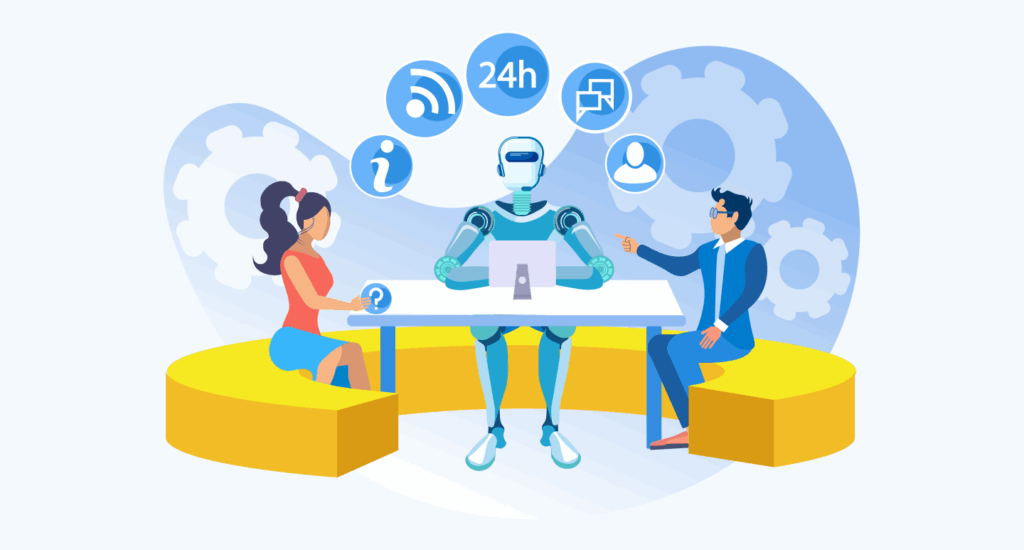
Case Study Highlights:
- E-commerce Brand: Integration of an AI agent resulted in cart abandonment dropping by 35% and resolution times being 60% faster.
- Insurance Provider: There was a 40% reduction in call centre volumes due to the implementation of automated policy handling.
- Healthcare Network: Utilising AI virtual assistants for follow-ups and appointment reminders led to a 25% increase in patient satisfaction scores.
The transformation occurring within companies is not just operational but strategic. After all, competitive advantages are established, loyalty is earned, and revenue per person is maximised.
AI Agents by the Numbers: Why Businesses Are Making the Shift
This trend is not a fad; moving to AI agents is a strategic decision formed by compelling data. Let’s examine the statistics that demonstrate the adoption and measurement of AI agents in business.
Adoption Rates and Market Growth
- By 2025, 85% of companies are forecast to have AI agents redefining business processes and augmenting customer interactions.
- Such rapid growth is being witnessed in the AI agents market. Its valuation is expected to jump from $3.7 billion in 2023 to $150 billion in 2025, most of these driven by enhancements in cloud-based AI and automation technologies.
- Of the tech firms today, roughly 50% have introduced AI agents into their operations, while 92% of the tech companies planning to invest in AI next year will include intelligent automation in their business plans.
Operational Efficiency and Cost Reduction
- Those using AI have recorded a 2.40% productivity boost, mainly in customer service and retention strategies.
- It is said that, by 2029, 80% of routine customer service problems will be resolved independently by AI agents without requiring human intervention in such simple cases.
- Companies like Klarna have benefitted well, with their AI chatbot carrying the load equivalent to the work of 700 full-time employees, leading to huge cost savings and increased efficiency in customer service.
Customer Preference and Experience
- Bots satisfy the immediate need of 51% of consumers, as indicated by a Zendesk report. Therefore, responsive AI agents become vital in customer satisfaction.
- Also, 68% of consumers believe that chatbots should exhibit the same level of expertise as human agents. Therefore, more sophisticated AI capabilities are needed from companies during customer interactions.
Industry-Specific Adoption
- For instance, in the retail industry, 63% of companies are using generative AI to enhance customer service outcomes. This figure demonstrates the industry’s keen interest in intelligent automation:
- The healthcare sector is also looking at AI agents for diagnostics and patient monitoring to improve health service access and health outcomes.
Security and Governance Issues
- While the gains above exist, 23% of IT professionals have cited the cases where the AI agents have been tricked into giving access credentials, which indicates the requirement for stringent security measures.
- Only 44% of organisations currently regulate the activities of AI agents, which would highlight the fact that there is room for improvement even as adoption continues to rise.
How Esferasoft Can Help You Transition from Chatbot to AI Agent
Choosing the right technology is only half the battle; its real value comes in terms of its strategic implementation, customisation for your business’s needs, and integration with existing systems. And that is where we come in.
For over ten years, Esferasoft has been delivering digital transformation solutions with a special focus on building intelligent, business-ready AI agents that work and, more importantly, work wonders.
Why Choose Esferasoft?
1. Custom AI Agent Development
We strongly oppose one-fits-all. We will build one for you after exploring your business aims, customer journeys, and data workflows, whether it be conversational AI for e-commerce, healthcare, finance, or customer service.
2. Full-Stack Knowledge
Our teams combine front-end, back-end, and AI/ML development so your AI agent works across all platforms, whether it be your website, mobile app, or integrated into your CRM or ERP system.
3. LLM & NLP Framework
We harness the power of large language models (LLMs), natural language processing (NLP), and generative AI to ensure that your agent is capable of interpreting complex queries, retaining context, and providing rich interactions.
4. Scalable and Secure Architecture
Our solutions have scalability and security built into their very fabric, which allows you to grow without fear of data degradation, compliance, or performance.
5. From A to Z
We offer full support—strategic development, deployment, and constant ongoing optimisation—to guarantee that your AI agents are evolving in parallel with your business.
Want similar results? Esferasoft is ready to help. [Schedule your free strategy call now.]
Make the Intelligent Choice for the Future of Your Business
Choosing the right tools to empower your communication channels is essential since customer experience can be a key determinant for a brand’s success. The difference between a traditional chatbot and an AI agent lies in their features, mindsets, capabilities, and business impacts.
Scripted responses, a lack of contextual understanding, and static behaviour have failed to meet the expectations of modern users. Such factors inhibit engagement and stifle any opportunity for gathering insights about the business. Although they can respond, their responses demonstrate limited comprehension.
AI agents represent a significant breakthrough in this regard. Their adaptability, personalisation, real-time learning, and deep integration enable companies to automate challenging tasks, create customer journeys, and scale without sacrificing human touch. AI agents are truly not just tools; they are digital partners that will learn and grow alongside your organisation.
When Should You Make the Move?
If your business is facing any of the following:
- High volumes of customer queries
- Need for multilingual or 24/7 support
- Growing pressure to deliver faster, more accurate service
- Operational inefficiencies due to repetitive manual tasks
- Demand for deeper customer insights and personalisation
Then it’s time to consider moving from a chatbot to a fully capable AI agent.
Are you prepared to enhance your customer experience in the future?
Let Esferasoft help you evolve from a basic chatbot to an intelligent, scalable AI agent built for the demands of tomorrow’s customers.
Contact us now for a free consultation and custom AI strategy at +91 772-3000-038.
